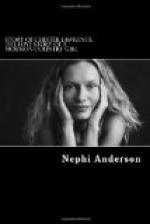Chester looked again at the post-card he had addressed to Kildare Villa, placed it aside, and wrote in its place a long letter.
CHAPTER X.
Twenty miles out of London. The sun is shining, and the train glides along by green fields, hedges of hawthorn, and blossoming trees. England looks to be the huge, well-cared-for farm of a very rich man. This may be explained by the fact that England is an old country, having been plowed and planted and harrowed for close on to a thousand years before America was discovered. This long period of cultivation gives the country-side a mellowness and well-groomed look. The vaporous sunlight softens all the outlines, hides the harsh features, and gives the landscape its dreamy, far-away, misty loveliness. There seems to be no angles in the scene; field melts into field, and hedge into hedge, with here and there a ribbon of a road which seems to join them rather than to separate them. The houses are of brick or of stone, many partly hidden under the climbing ivy or roses.
Chester Lawrence is accompanying Elder Malby eastward from London through Kent to Margate and Ramsgate on the coast. Elder Malby is to attend to some Church duties, and Chester, by invitation, was glad to accompany him. It was the young man’s policy to keep in touch as much as possible with the elders and their work, and he was getting somewhat of the missionary spirit himself. He was greatly enjoying this ride through the beautiful country.
“It’s really wonderful,” said Chester, looking out of the car window, “this coming from London into the country. Where are all the people? Are they all in town? Some cows are browsing in the pastures, and sheep scurry about as the train flies by, but where are the people who have made this great garden?”
“You must remember,” explained Chester’s companion, “all this has not been done hurriedly by many people within a short time. What the Englishman doesn’t do today he can do tomorrow; and so centuries of work by a few men has produced what we see.”
“Well, I do occasionally see a few slow-moving men and women, somberly clad in grays and browns. These, I suppose, are the sturdy supporters of their country.”
“Here is something I clipped from an American magazine,” said Elder Malby, “which impressed me with its peculiar truth.” He read:
“’England is London says one, England is Parliament says another, England is the Empire says still another; but if I be not much mistaken, this stretch of green fields, these hills and valleys, these hedges and fruit trees, this soft landscape, is the England men love. In India and Canada, in their ships at sea, in their knots of soldiery all over the world, Englishmen must close their eyes at times, and when they do, they see these fields green and brown, these hedges dusted with the soft snow of blossoms, these houses hung with roses and ivy,




